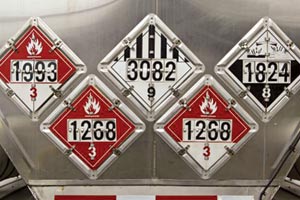Senior Reporter
FMCSA Issues Changes to Hazmat Carrier Oversight Policy

Federal Motor Carrier Safety Administration officials said they will soon begin toughening oversight of the nation’s hazardous material carriers, closely monitoring their Compliance, Safety, Accountability scores on a monthly basis.
The opposite could be true for some mostly small hazmat operators, who will be allowed to stay under the agency’s enforcement radar for up to four years because they get so few roadside inspections.
The changes, which will be effective Aug. 18, are in response to findings contained in a Department of Transportation congressionally mandated 2014 study of ways to keep a closer eye on hazmat operators.
The new enforcement policy will target carriers that transport such dangerous commodities as radioactive materials, large quantities of explosives, toxic inhalants and refrigerated liquefied methane or natural gas.
“The Safety Measurement System approach provides a strengthened, continuous monitoring process for hazardous materials safety permit holders that merit heightened oversight and monitoring due to the dangerous nature of the materials they transport,” the agency said in a June 19 Federal Register post outlining the new policy.
The policy also is intended to comply with the fiscal 2015 funding law passed in December that no longer permits the agency to automatically deny an application to renew a hazmat safety permit based on the carrier’s hazardous material out-of-service rate.
In that case, the law allows the carrier to submit a written description of corrective actions taken to head off a serious agency action.
Specifically, the new policy calls for FMCSA to review permit holders' CSA safety measurement scores monthly to determine if the carrier has met or exceeded Behavior Analysis and Safety Improvement Category, or BASIC, intervention threshold for the two preceding months.
If the agency finds that a carrier has not met or exceeded the threshold in either the hazmat BASIC or a total of two of the other six BASICs, the carrier will be prioritized for a full compliance audit that could lead to a revocation or suspension of safety permit.
“SMS monitoring further allows the agency to expeditiously identify carrier problems and better focus on specific areas that the carrier must address immediately in order to avoid potential suspension or revocation of its HMSP,” the agency said.
Hazmat carriers who have too few roadside inspections to create a CSA score will be permitted to renew their two-year safety permits once and then be required to submit to a compliance audit to renew the permit two years later.
Boyd Stephenson, vice president of international supply chain operations for American Trucking Associations, said the trade organization regards the policy change as a mixed blessing.
“It’s sort of squeezing on one side and letting off pressure on another,” Stephenson said.
Federal records show that almost 11,000 interstate and intrastate motor carriers have had an inspection indicating that they transport hazardous material requiring placards. However, only about 1,500 motor carriers possess a hazmat safety permit.
Under the current agency policy, to obtain or renew a hazmat safety permit, a carrier must have a crash rate and a driver, vehicle, hazardous material or total out-of-service rate in the “top 30% of the national average.”
“FMCSA is going to now do continuous monitoring, which we’re very supportive of,” Stephenson told Transport Topics. “They’re going to do that continuous monitoring based on CSA, which we are not supportive of.”
Cynthia Hilton, executive vice president of the Institute of Makers of Explosives, said the new policy is a double-edge sword and that that her group is unable to predict its effect on hazmat carriers.
“The carrier’s ability to improve itself in the short term of a two-month window can be problematic — just because of the way CSA collects and interprets data.” Hilton told TT.
She added, “The relative good is the agency was never looking at those carriers that they had no data on before. And now they will be.”



